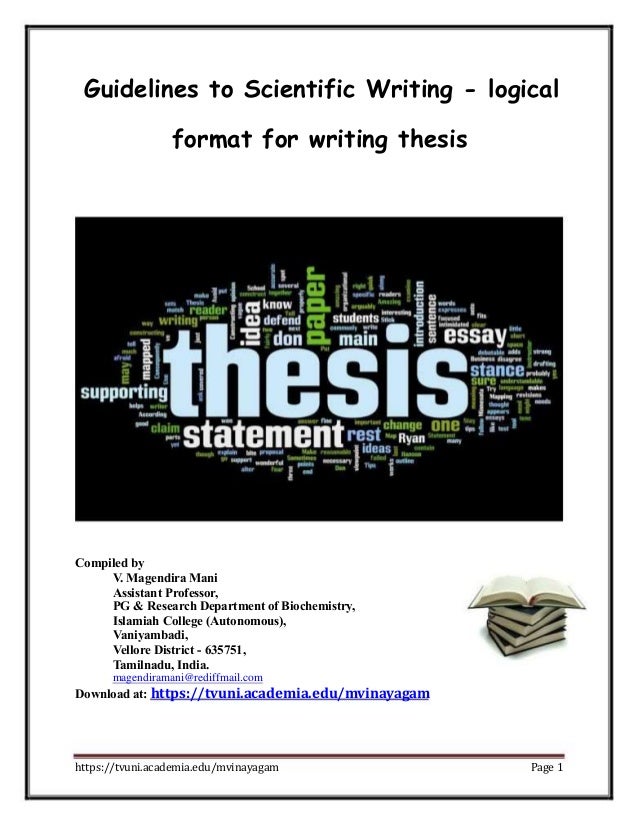1/5/ · This second edition of David Lindsay’s popular book Scientific Writing = Thinking in Words presents a way of thinking about writing that builds on the way good scientists think about research. The simple principles in this book will help you to clarify the objectives of your work and present your results with impact. Fully updated throughout, with practical examples of good and bad writing Scientific writing, while an indispensable step of the scientific process, is often overlooked in undergraduate courses in favor of maximizing class time devoted to scientific concepts. However, the ability to effectively communicate research findings is crucial for success in the biological sciences. Graduate students are encouraged to publish early and often, and professional scientists are Cited by: 10 science writing, the tone is generally formal, objective and informative. Examples of science writing you may do include lab reports, journal article summaries, research proposals, theses and grant applications. In this part of the guide, the typical structure of a science document is outlined. Title Is the title clear and informative, and does it reflect the contents of the report or paper
Definition and Examples of Science Writing
Published: Tues. Graduate Connections recently spoke with Dr. Rick Lombardo from the Office of Graduate Studies about scientific writing and his best advice for writing well. He's presented writing workshops to both academic and non-academic audiences for over 15 years and continues to share his knowledge and experience with students. Scientific writing is not just writing about science; it is the technical writing that scientists do to communicate their research to others.
Scientific writing is predicated on the rigors of scientific inquiry, so it must reflect the same precision as that demanded in the research process. Scientific communication demands precision the precise use of words and phrasesscientific writing, clarity, and economy, scientific writing.
This distinction scientific writing an important one because the writer is communicating highly technical information to others who might, scientific writing, or might not, scientific writing, be as knowledgeable; they may be from a different discipline; they may, or may not, scientific writing, be a native speaker of the language used.
Many journals have international audiences, so precise communication helps prevent misunderstandings and mistranslations in other contexts. Communicating facts, figures, and methods used in research——as well as the description of the results——has to be precise and exact. The research question, hypotheses, methods, analysis, and conclusions must be stated clearly and simply.
First, scientific writing should focus on the words they use and their punctuation. Subtle differences in word choice or punctuation can have significantly different meanings. Here are a few examples:. Also, the organization of your writing is critical. The organization of a paper is logical, with rules for what goes into each section. Read papers from your particular discipline to understand the relevant rules.
Briefly, your order of presentation should make the most sense to your reader. In a Methods section, the description should be complete scientific writing to enable someone else to repeat your work. Also, explain why each procedure was done, i. This is the point where scientific writing most noticeably resembles other types of writing.
It must make sense to the reader. You have one chance. And, of course, scientific writing, the first step in being logical is in the creation of an outline before you begin writing. This scientific writing the step that takes the greatest investment of time. All sentences in a paragraph should support or elaborate upon what your topic sentence says you plan to discuss. You should be able to provide scientific writing rationale for why each sentence is placed where it is in each paragraph.
All of your paragraphs should be logically organized around your section headings or sub-headings. You should have a rationale for where each paragraph is placed. You must maintain a natural logic that is accessible to the reader. However, if you can clearly explain your work, it will be understood by more people.
There are many great books on writing for academics. One book I like to recommend is Academic Writing for Graduate Students. You can also form a writing group with other graduate students.
Having someone else read and respond to your writing will help you catch places where the meaning is unclear, scientific writing. Skip to main content. Nebraska Graduate Connections Scientific Writing. Subscribe to Connections.
How to write a scientific paper
, time: 8:34Scientific writing - Wikipedia

Scientific writing, while an indispensable step of the scientific process, is often overlooked in undergraduate courses in favor of maximizing class time devoted to scientific concepts. However, the ability to effectively communicate research findings is crucial for success in the biological sciences. Graduate students are encouraged to publish early and often, and professional scientists are Cited by: 10 science writing, the tone is generally formal, objective and informative. Examples of science writing you may do include lab reports, journal article summaries, research proposals, theses and grant applications. In this part of the guide, the typical structure of a science document is outlined. Title Is the title clear and informative, and does it reflect the contents of the report or paper 1/5/ · This second edition of David Lindsay’s popular book Scientific Writing = Thinking in Words presents a way of thinking about writing that builds on the way good scientists think about research. The simple principles in this book will help you to clarify the objectives of your work and present your results with impact. Fully updated throughout, with practical examples of good and bad writing
No comments:
Post a Comment